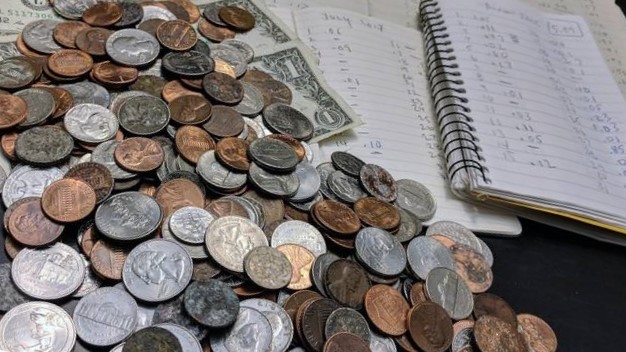Landlord, the lord of the land. This word from Middle English certainly implies wealth and power, and many billionaires made their fortune in real estate. Many more landlords found a path to financial ruin. Do landlords get rich?
Landlords can get rich, but the bulk of this wealth will be on paper for many years. If their properties are appropriately managed, most landlords will become wealthy over time. However, many risks are associated with owning rental property, and some landlords go broke before they get rich.
Over time rents increase, property values increase, and mortgages are paid off. It may take decades to realize the wealth you are accumulating, and a misstep can leave you broke. As the rents on a rental property increase, the loan payment will stay the same. This difference gives you a monthly income and builds wealth as the loan balance is paid down. To see an illustration of this process, read my article about generating wealth by buying one property per year.
How Do Landlords Make Money?
Do Landlords Get Rich? Before answering that question, it’s important to understand how a landlord makes money; it’s not only from collecting rent. In this section, I will delve into the different ways that a landlord makes money.
1. Cash Flow
Positive cash flow is the passive income that a landlord earns each month. This is the amount left over after making the mortgage payment, paying property taxes, and paying other expenses. It’s important to note that cash flow can vary from month to month depending on various factors, such as vacancies or unexpected repairs. Tracking it over time is essential to get an accurate picture of the property’s profitability.
For example, if a property owner collects $1,000 in rent each month and has $400 in expenses and a $400 mortgage payment, their cash flow would be $200 monthly. If the landlord has no mortgage or the mortgage has been paid off, this monthly cash flow jumps from $200 per month to $400 per month. As you can see, paying off a mortgage has a significant impact on the landlord’s bank account.
2. Amortization
Paying Down the Principal. Amortization is the process of paying off debt over time by making regular payments that cover both the principal and the interest. Interest is the cost of borrowing money, while the principle is the amount borrowed.
When you make a mortgage payment, a portion of the payment goes toward paying down the principal, and another part goes toward paying the interest. The payment is usually the same amount each month, but the proportion that goes toward principal and interest changes over time. At the beginning of the loan, most of the payment goes toward interest, but as the principal is paid down, the interest portion of the payment decreases, and the principal portion increases.
Paying interest is an expense and the cost of borrowing money. Paying the principal may seem like an expense, but it’s not. When a landlord pays the principal, they are, in effect, paying themselves. For each dollar of principal a landlord pays, they get a dollar of equity in the property. The more the principle is paid down, the more their net worth increases. Eventually, the loan is paid off, and the entire monthly payment amount is added to the cash flow.
This is an excellent example of using Other People’s Money (OPM). Real estate investors use the bank’s money to purchase the property and the tenant’s rent payment to repay the loan. Over time this can create significant wealth.
3. Appreciation
Property appreciation is the increase in the value of a real estate property over time. It is the difference between the original purchase price of the real estate investments and their current market value.
Property appreciation is speculative, but when it occurs, it passively adds to wealth and increases the return on investment. It’s important to note that property values can also decline due to the real estate market, property location, or economic changes. Therefore, it’s essential to carefully consider all factors before investing in real estate.
A 2016 study shows that the average appreciation is between 3.3% and 6.5%, and in recent years the home prices have grown much faster than the average. Below are some of the major factors influencing home value appreciation.
Renovations and improvements: Upgrading a property, such as adding new appliances or renovating a kitchen, can increase its value.
Location: Properties in desirable locations, such as high-growth areas or near amenities like schools, shopping, and public transportation, tend to appreciate more quickly.
Economic factors: Economic growth, inflation, and interest rates can all affect property values.
Supply and demand: If there are more buyers than available properties, prices tend to increase due to competition.
4. Tax Treatment
The tax benefits of owning real estate are valuable. The three biggest of these benefits are:
1031 exchange: Real estate investors can use a 1031 exchange to defer taxes on the sale of a property by using the proceeds to purchase another property. A 1031 exchange, also known as a like-kind exchange, is a tax-deferred exchange that allows real estate investors to sell a property and use the proceeds to purchase another property without paying taxes on the capital gains from the sale. Instead, the gain and accumulated depreciation are transferred to the new property. This will not avoid income taxes, but it delays the payment of taxes allowing the investor to use their equity to compound wealth accumulation.
Depreciation deduction: Real estate investors can take advantage of the depreciation deduction, which allows them to deduct a portion of the property’s value from their annual taxable income. This deducation reduces the taxable income from the rental house and can sometimes be used to reduce taxable income from other sources.
Capital gains exclusion: Homeowners who sell their primary residence may be eligible for a capital gains exclusion of up to $250,000 for individuals and up to $500,000 for married couples filing jointly. This means that they don’t have to pay taxes on the capital gains from the sale of their home up to these limits.
In addition to these benefits, most costs associated with real estate investing are tax deductible. This includes expenses such as mortgage interest and property taxes. It’s important to note that the tax benefits of owning real estate can vary depending on individual circumstances and the specific tax laws in a given area. Therefore, it’s recommended to consult with a tax professional to fully understand the tax implications of owning real estate.
5.Hedge Against Inflation
Real estate can act as an inflation hedge because its value tends to increase with inflation. Inflation is the general increase in prices of goods and services over time, which reduces the purchasing power of money. When inflation occurs, the prices of real estate properties also tend to increase, which means that real estate can appreciate and provide a return that exceeds the inflation rate.
Here are the top three benefits that inflation provides for investment property.
Rental income increases: When inflation occurs, the cost of living increases, and tenants may be willing to pay higher rent prices to keep up with the increased cost of living. This means the rental income generated by real estate properties can also rise over time, providing a higher return on investment.
Mortgage payments remain stable: Real estate investors who take out fixed-rate mortgages can benefit from their mortgage payments staying the same over time, even as inflation occurs. This means that the investor’s monthly mortgage payment becomes less expensive in real terms as inflation increases.
Property values increase: As the prices of goods and services increase due to inflation, the prices of real estate properties also tend to increase, which means that the value of real estate can appreciate over time.
How to Amplify the Return of Rental Properties
Paying the Right Price for a Rental House
You make money when you buy, or so the adage goes. It’s true. The amount you pay will affect your investment result as long as you own the property. You may never profit if you spend too much, no matter how well you do with the other aspects of your rental business. On the other hand, a great deal on the purchase can offset mistakes made down the road.
How much should you pay? That is not an easy question, but there is an answer. Studies have shown that, on average, operating expenses on a rental house are about 40% of the rental income. This leaves you with 60% of the rent as your profit. But wait! If you have a mortgage, you must make the loan payments out of that 60%.
Let’s look at the 1% rule, which states that your rent should be 1% of the price of the house. Indeed, rents are usually about 1% of the property’s market value, but you must avoid paying market value. My years of experience have shown that the 1% rule will not work when investing in single-family homes.
You can’t control the rent, but you can control what you pay for the property. You should never pay more than 50 times the market rent for a rental property, and following this rule is how landlords get rich. I delve deeper into this topic in an article that teaches you how much to pay for a rental house.
Do landlords get rich? They can, but the first step is getting a good deal on purchase of the property.
Maximizing Rental Income

Getting extra rent is always nice, but you can only rely on getting fair market rent. It would be best if you based all your calculations and planning on market rent which, by definition, you should be able to get. Once you have a lease at market rent, you must ensure that you collect the market rent, which is more complicated than it seems.
It is imperative that you collect the rent each month and charge appropriate late fees when it’s not paid promptly. If you let a tenant get more than one month behind, it’s usually less expensive for them to move than it is to get caught up. Paying a security deposit and the first month’s rent is generally less than the two months they owe, with late fees added.
Properly vetting prospective tenants is the best way to ensure the rent is paid promptly. A landlord must make sure that their business plan includes steps for finding the right tenants. This approach will have the most significant impact on filling properties with good tenants and ensuring long term success.
I’ve been doing this for 15 years, and I have been awarded over 100 judgments for past-due rent and have collected $0 from these judgments. It is crucial that you collect the rent when it’s due; if you don’t, you may never see that money. Both the tenant and the landlord should avoid a growing past-due balance.
The landlord’s primary responsibility is maintenance, and the tenant’s primary responsibility is to make rent payments. As a landlord, do your part promptly, provide a property in good condition, and don’t be a slumlord. Ensure your tenants perform their part; if they do not, get them out as fast as you legally can. If you need more help on this, I have an article that teaches you how to handle non-paying tenants.
Do landlords get rich? They can, if they effectively collect the rent.
Minimizing Rental Operating Expenses
Minimizing the operating expense for investment properties is vital if you plan to stay in the landlord business. A landlord should learn what the expense ratio should be, then follow the five steps below to minimize the costs.
- Screen Tenants. Unreliable tenants increase tenant turnover.
- Handle Routine Maintenance. Don’t let minor problems turn into expensive problems.
- Review your Mortgage. Keep an eye on rates and refi whenever it will save you money.
- Get Bids for Big Jobs. Don’t get comfortable with a single contractor. Always get multiple bids to ensure you are getting the best value.
- Take the Tax Deductions. Work with a CPA specializing in rental properties so you will know all the deductions that apply to you.
Do landlords get rich? They can, if they properly manage the expenses realted to rental homes.
Self Funding Growth
As property owner makes mortgage payments, the equity in their properties increase. A landlord working with a community bank can tap that equity by obtaining a line of credit on the rental units. This line of credit will allow the investor to quickly buy more properties, bypass the appraisal process, and completely avoid lender underwriting. As a result, the investor will be able to purchase more rental units and ramp up the growth of their real estate holdings.
The self-funding nature of investment real estate builds on itself. The investor uses existing equity to purchase more properties, and through the magic of “paying down the principal,” they eventually have more equity to repeat the process.
Another benefit of the increase in equity is the ability to move to bigger properties. The equity in your rental portfolio can be borrowed and used as a down payment for an apartment building. With this approach, a landlord can amplify their wealth creation. Over time, this process of creating equity will apply to the new properties, allowing a savvy real estate investor to repeat the process.
Other Ways to Make Money with Real Estate
Flipping
House flipping is when an investor purchases a house and then quickly sells it, hopefully for a profit. The holding time usually involves extensive renovations or other modifications to make the home attractive to homeowners. Flipping can provide a significant cash return, but not a long-term scalable income. Read this guide to flipping houses to learn everything you need to know.
BRRRR
A BRRRR investment is similar to owning rental houses, but the owner cashes out most of the equity early in the process. BRRRR stands for Buy, Renovate, Rent, Refinance, and Repeat. This strategy can provide the large cash return similar to flipping, with some of the equity accumulation found with rentals. In this article, I cover the difference between the flipping and BRRRR real estate strategies.
Wholesaling
Wholesaling real estate is an investing strategy that requires very little money. The wholesaler contracts to buy properties and then sells the contract to other investors. This approach can be lucrative as long the wholesaler can find deals and buyers. Very little money is required because a wholesaler never closes on the house. For more information, check out my in-depth article on wholesaling real estate.
ETF
An exchange-traded fund (ETF) is a group of securities bought and sold as a group, similar to a mutual fund. Some ETFs invests in real estate, and investors can purchase shares through the stock market. These investments are more liquid than owning rental properties and offer many of the same tax advantages.
REIT
A real estate investment trust (REIT) is a company that owns, operates, and finances real estate investments. REITs are similar to mutual funds in that they pool contributions from multiple investors and are usually publicly traded. As a result, a REIT is much more liquid than personally owning real estate. REITs invest in many real estate property types, including single-family rentals, apartment buildings, commercial buildings, and even cell towers.
REIG
A real estate investment group (REIG) is a business that purchases real estate and sells it to an investor, but the REIG retains the administration and maintenance responsibilities. A REIG often buys multi-unit residential properties, but a few have ventured into the single-family real estate market. Unlike a REIT, a REIG is not publicly traded and is not subject to the same disclosures. Investments in a REIG are illiquid, and the investors are treated as partners, receiving K-1 tax documents.
Crowdfunding
Crowdfunding uses small amounts of capital from many individuals to finance a business venture. Crowdfunding allows investors to contribute as little as $10 to a real estate project but often has the same restrictions as investing in a hedge fund.
The Bottom Line
Do landlords get rich? They can, if they purchase the rental houses at the right price, effectively collect the rent and keep operating expenses in check. A landlord’s residential real estate portfolio produces income in several ways, such as cash flow, amortization, and appreciation. In addition, it acts as a hedge against inflation while offering favorable tax treatment.
In addition to becoming a landlord, there are other ways to invest in real estate. Some methods require you to deal with the properties; others are hands-off and work more like buying a stock.
The key to getting rich being a landlord is consistency. Don’t pay too much for the house, ensure the rents are collected and stay on top of expenses. Following these rules will allow you to scale your business to a massive level and watch your wealth grow over the years. However, if you neglect the rules above, you may have a hard time covering your expenses.




